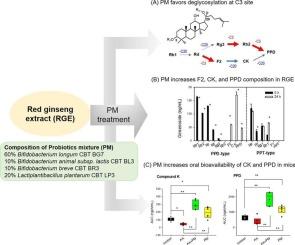益生菌混合物对去糖基化人参皂苷生物转化和生物利用度的影响
IF 4
2区 农林科学
Q2 FOOD SCIENCE & TECHNOLOGY
引用次数: 0
摘要
我们的目的是研究由植物乳杆菌、短双歧杆菌、动物双歧杆菌组成的益生菌混合物的作用。人参皂苷Rb1和红参提取物对人参皂苷生物转化的影响。口服Rb1被代谢成五种去糖基化的人参皂苷,并被小鼠肠道吸收。复合物K和原嘌呤二醇在益生菌混合物的作用下显著升高,在阿莫西林的作用下显著降低,而Rb1和Rd无显著变化,说明复合物K和原嘌呤二醇的生物转化对益生菌混合物敏感。红参提取物与益生菌混合物孵育也改变了人参皂苷的分布:单糖基化的人参皂苷和苷元如化合物K、原人参二醇和Rh1在24 h后升高。它们的血浆浓度反映了益生菌混合物干预改变了人参皂苷在肠道中的生物转化过程。综上所述,通过添加益生菌混合物激活微生物组,可以提高单糖基化人参皂苷和苷元的全身利用度,从而提高红参提取物的治疗效果。本文章由计算机程序翻译,如有差异,请以英文原文为准。

Effect of a probiotic mixture on the biotransformation and bioavailability of deglycosylated ginsenosides
We aimed to investigate the effects of a probiotic mixture comprising Lactiplantibacillus plantarum, Bifidobacterium breve, Bifidobacterium animal subsp. lactis, and Bifidobacterium longum on ginsenoside biotransformation using ginsenoside Rb1 and red ginseng extract. Orally administered Rb1 was metabolized into five deglycosylated ginsenosides and absorbed in the murine gut. Plasma Compound K and protopanaxadiol increased significantly by probiotic mixture and decreased by amoxicillin, without significant change in Rb1 and Rd. This suggest that biotransformation of Compound K and protopanaxadiol are probiotic mixture-susceptible. Incubation of red ginseng extract with probiotic mixture also altered the ginsenoside profile: monoglycosylated ginsenosides and aglycones such as Compound K, protopanaxadiol, and Rh1 increased after 24 h. Their plasma concentrations reflected the altered ginsenoside biotransformation process in the gut by the intervention of probiotic mixture. In conclusion, microbiome activation via probiotic mixture supplementation enhance the systemic availability of mono-glycosylated ginsenoside and aglycone and, consequently, may improve therapeutic efficacy of red ginseng extract.
求助全文
通过发布文献求助,成功后即可免费获取论文全文。
去求助
来源期刊

Journal of Functional Foods
FOOD SCIENCE & TECHNOLOGY-
CiteScore
9.60
自引率
1.80%
发文量
428
审稿时长
76 days
期刊介绍:
Journal of Functional Foods continues with the same aims and scope, editorial team, submission system and rigorous peer review. We give authors the possibility to publish their top-quality papers in a well-established leading journal in the food and nutrition fields. The Journal will keep its rigorous criteria to screen high impact research addressing relevant scientific topics and performed by sound methodologies.
The Journal of Functional Foods aims to bring together the results of fundamental and applied research into healthy foods and biologically active food ingredients.
The Journal is centered in the specific area at the boundaries among food technology, nutrition and health welcoming papers having a good interdisciplinary approach. The Journal will cover the fields of plant bioactives; dietary fibre, probiotics; functional lipids; bioactive peptides; vitamins, minerals and botanicals and other dietary supplements. Nutritional and technological aspects related to the development of functional foods and beverages are of core interest to the journal. Experimental works dealing with food digestion, bioavailability of food bioactives and on the mechanisms by which foods and their components are able to modulate physiological parameters connected with disease prevention are of particular interest as well as those dealing with personalized nutrition and nutritional needs in pathological subjects.
 求助内容:
求助内容: 应助结果提醒方式:
应助结果提醒方式:


